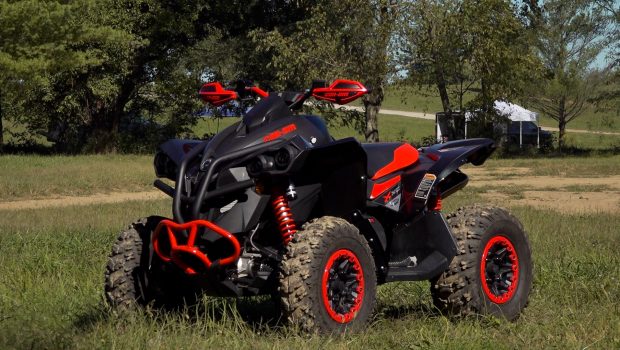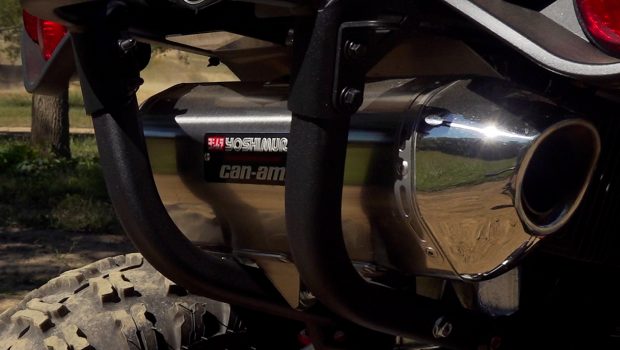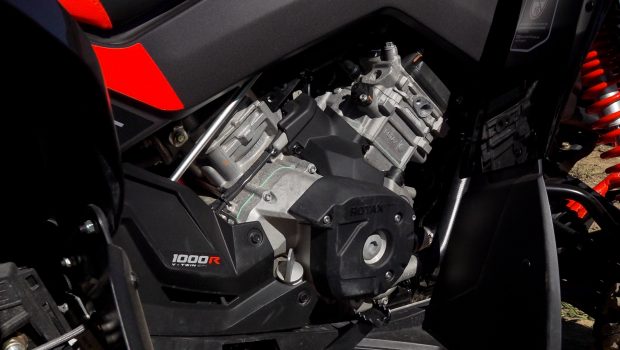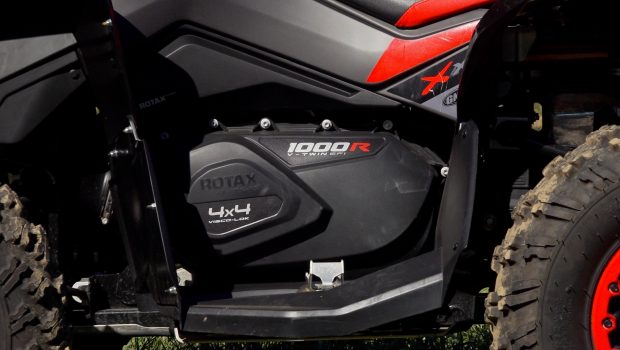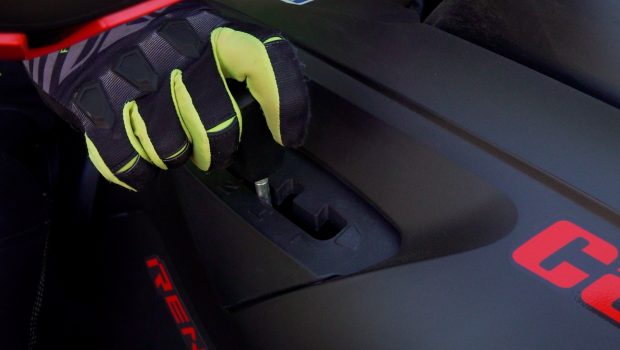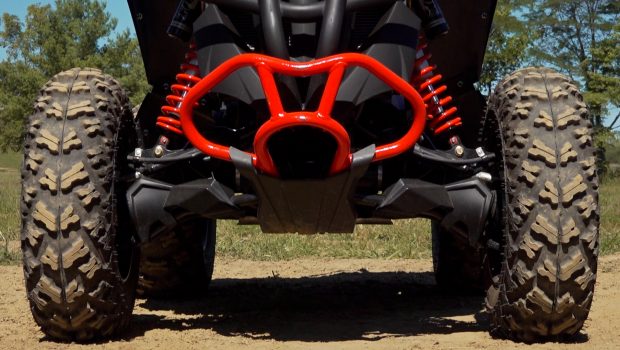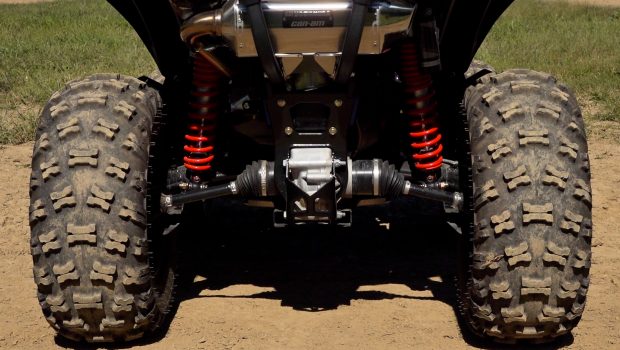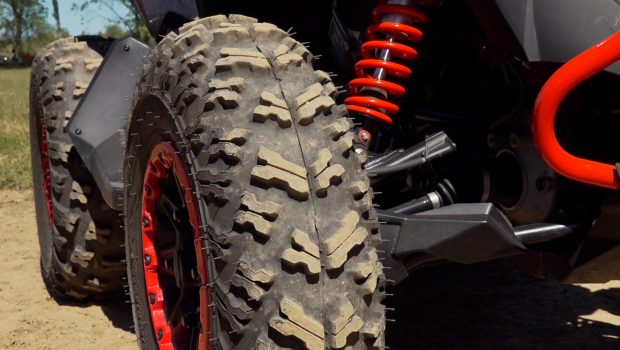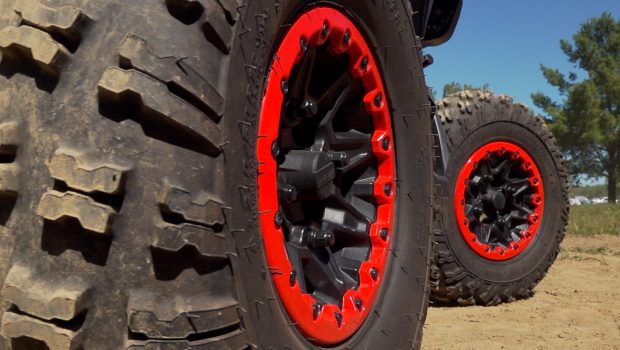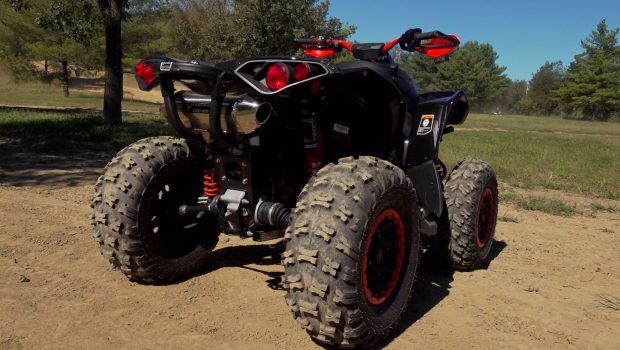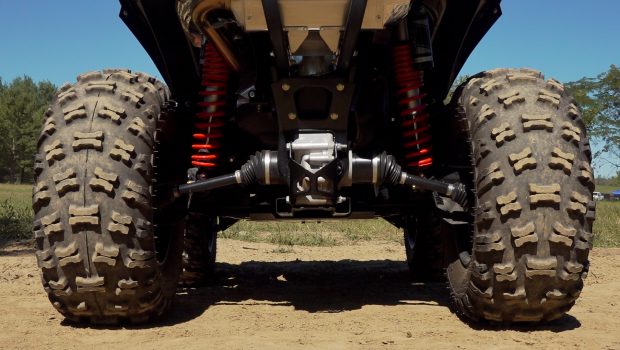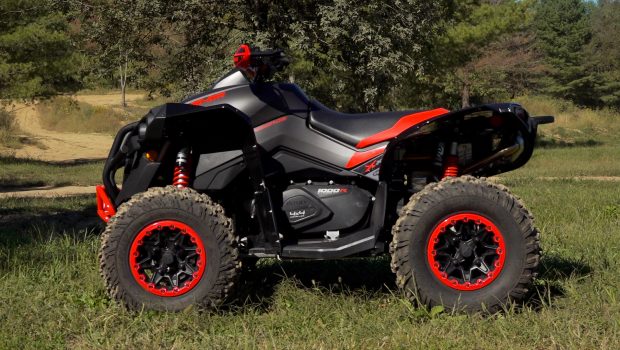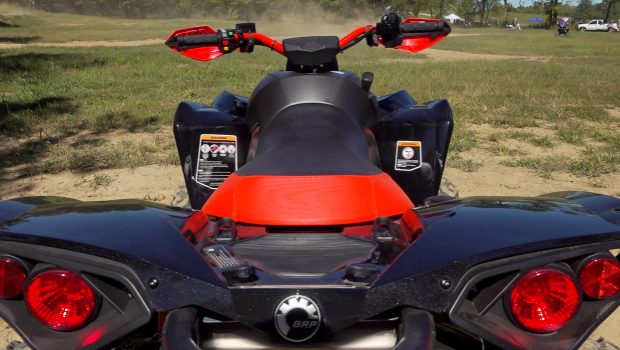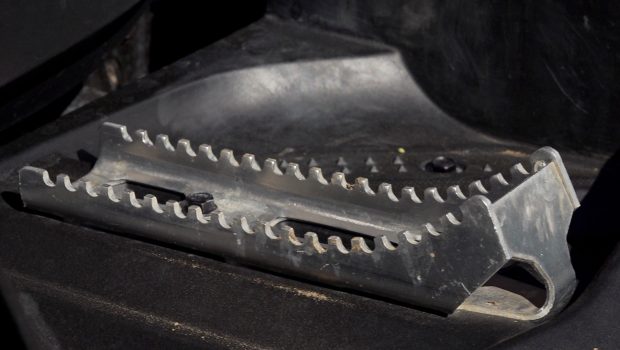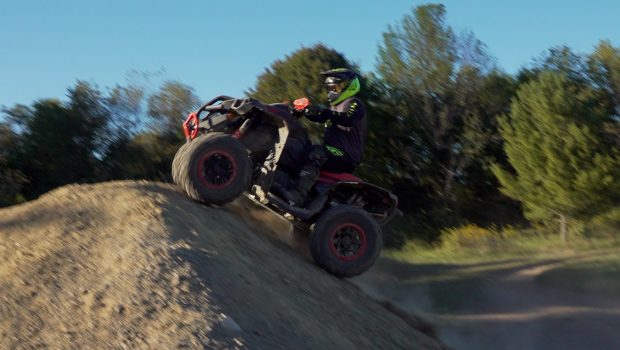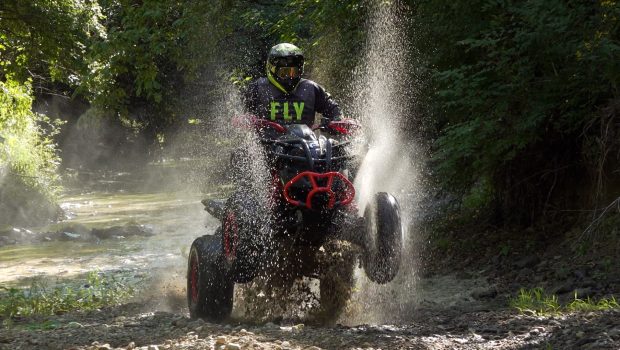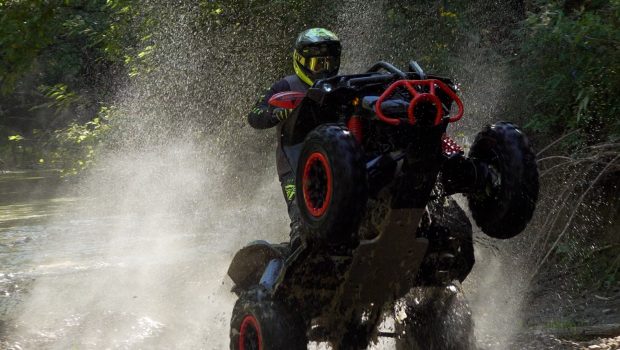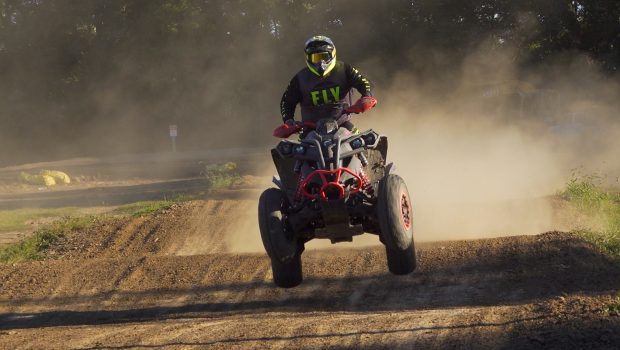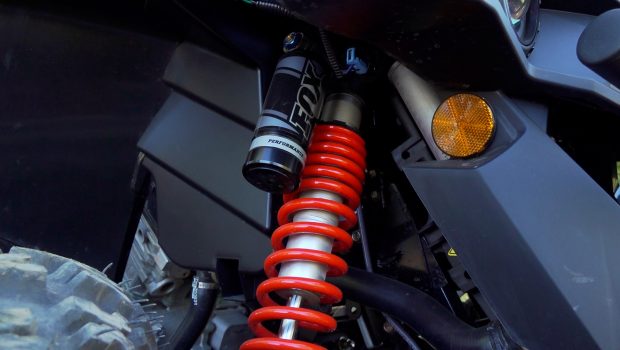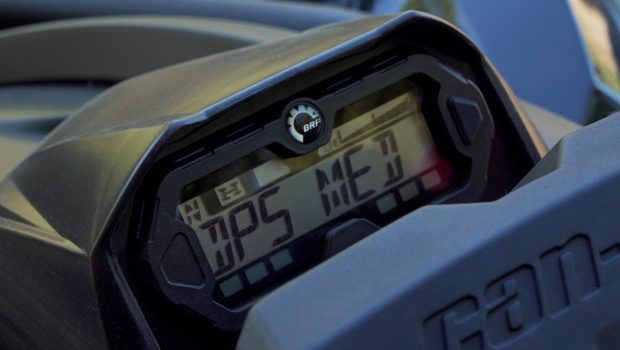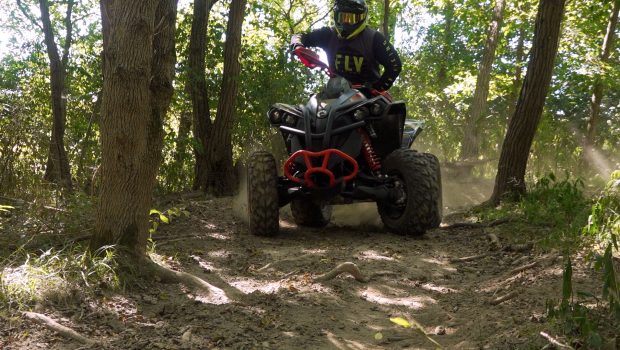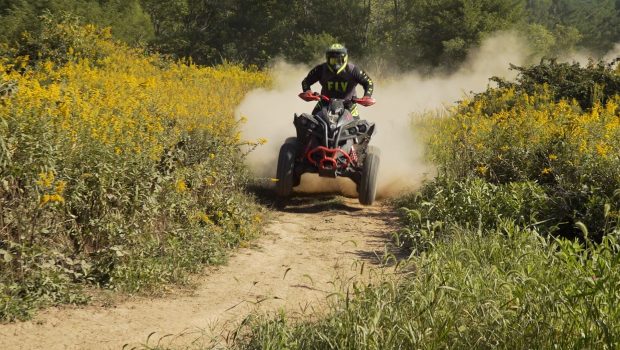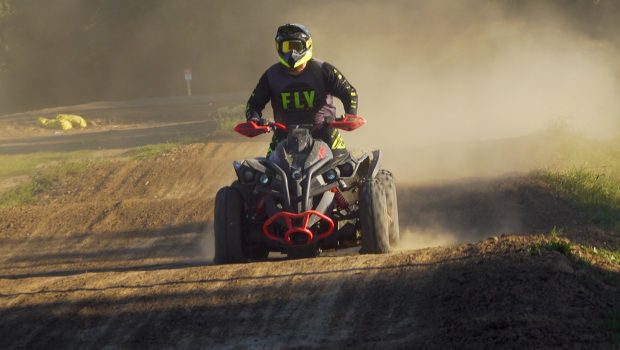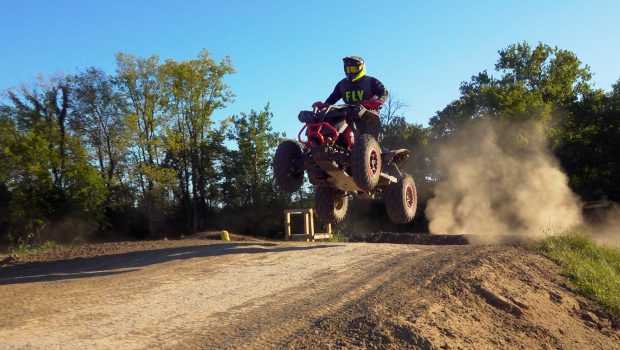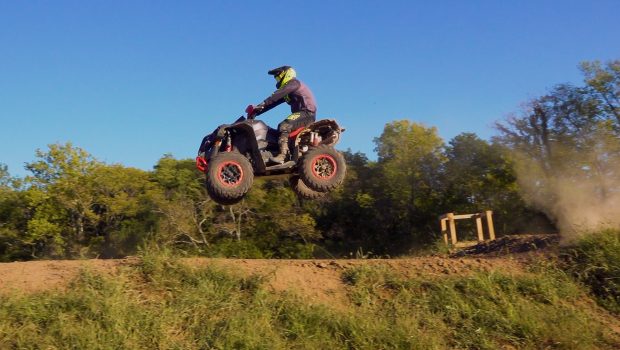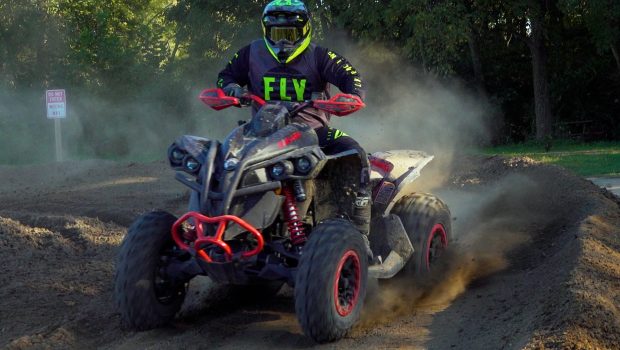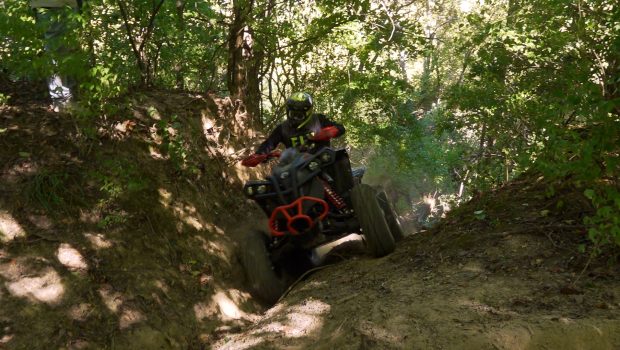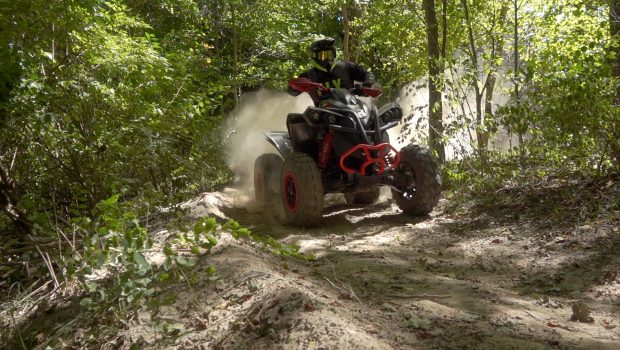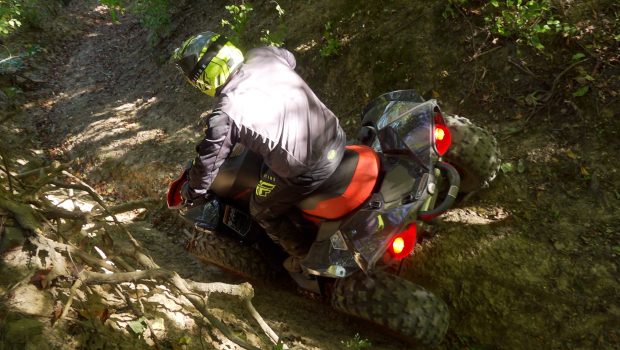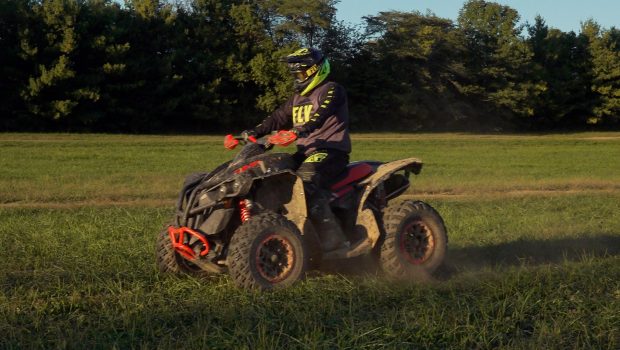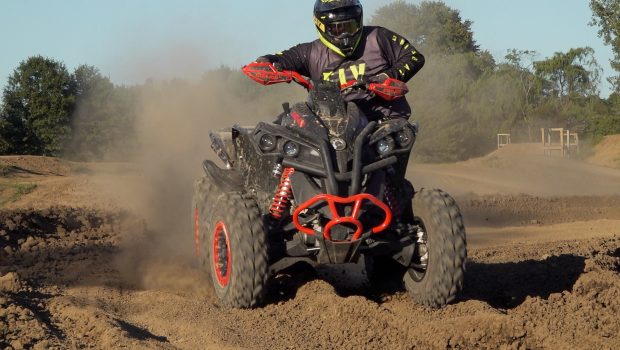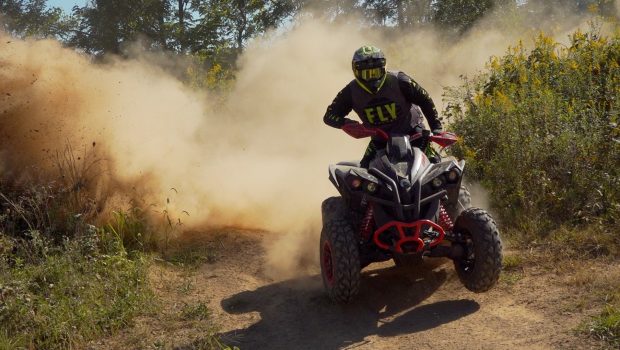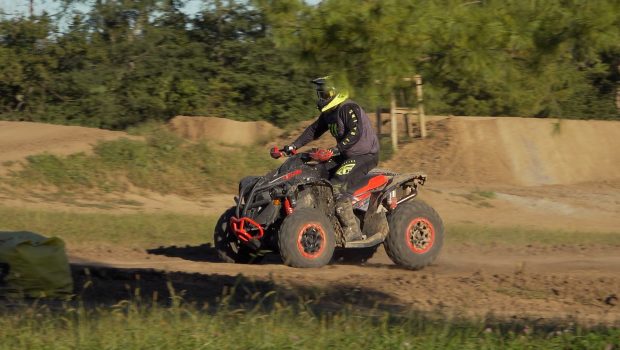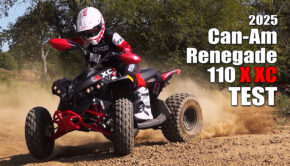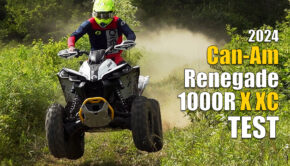Published on December 22nd, 2020 | by Joe
2021 Can-Am Renegade 1000R X XC Test Review:
2021 Can-Am Renegade 1000R X XC Test Ratings
Summary: Whether you’re in need of a 4x4 race quad or simply want the fastest 4x4 ATV in the woods, the Can-Am Renegade 1000R X XC is your ATV.
4.2
2 Month Test
2021 Can-Am Renegade 1000R X XC Test Review:
The Fastest 4×4 in the Woods
The Can-Am Renegade–– for more than a decade, this sport 4×4 has been one of the most radical and thrilling ATVs you can throw a leg over. When the original Renegade 800 was released in 2007, its performance easily eclipsed the other Sport 4×4 machines of the time like the Yamaha Wolverine 450 or Polaris Sportsman 500.
In 2008, the Renegade 500, later 570, along with the 800 X package were added. The 800 X benefited from fully adjustable, reservoir equipped, KYB HPG shocks, aluminum handlebars, raised metal foot pegs, aluminum skid plate, and reinforced aluminum wheels.
Based on what Can-Am learned in GNCC racing, the Renegade X XC, cross-country race package was introduced in 2010. Building on the X package ,it gained adjustable dual mode Dynamic Power steering, ½” front sway bar, Can-Am’s faster engaging Visco-Lok QE front differential, and beadlock aluminum wheels.
The 82hp Renegade 1000 was added in 2012; the perfect time for Can-Am to introduce their G2 chassis. The G2 Chassis was lighter, stronger, stiffer, and better handling thanks to a revised geometry. Dynamic power steering also went from bi to tri-mode for 2012 with a 3rd power steering map.
Can-Am boosted the 1000’s horsepower output to 89hp in 2016 to keep pace with the power output of the Polaris Scrambler XP 1000, released in 2014. Even still, the 82hp version was good enough to beat out the Polaris Scrambler XP 1000 in the Dirt Trax 2014 Shootout.
In 2019, Can-Am once again increased power on the 1000, to 91hp, accompanied by a number of even more significant updates to the chassis and suspension. Sharing nearly identical engines, chassis and base suspension settings, with the sport utility Outlander 1000R, Can-Am put most of their effort into marketing the Outlander’s updates leaving some enthusiasts completely unaware that the Renegade had even been updated, which we’re about to take care of.
Whether you’ve followed the Renegade since its release, or are taking a look at it for the first time, it’s with the same level of adrenaline, anticipation, and nervousness we experienced when we threw a leg over an ATV for the first time that we bring you our test review of the 2021 Can-Am Renegade 1000R X XC.
Options
There are three displacement options available for the Renegade, all of which enjoy a majority of the chassis and suspension updates from 2019. There’s the amazingly well priced 570 for $8,449 and the $10,299 850, both of which are not power steering equipped. The power steering equipped X XC packages are available starting at $12,999 for the 850 and $13,949 for the 1000. The black and Can-Am Red version we’re testing lists for $14,149.
Can-Am sent our test unit to us with a co-branded, stainless steel, Yoshimura performance exhaust. Yoshimura tells us the exhaust was built to meet a 96db limit. It will work with the stock fuel mapping, but we’d recommend adding a fuel management system to maximize horsepower and lower operating temperatures. It is lighter than the stock exhaust and comes with a USFS approved spark arrestor. An Extreme front bumper had also been installed.
Engine
Along with its low profile fenders and racy lines, the Renegade foregoes the engine cover, exposing its imposing Rotax power plant. The 1000R is powered by a water-cooled, fuel-injected, 976cc, V-twin, four-stroke engine with four valves and SOHC per cylinder. The automatic CVT transmission features high and low ranges, plus neutral, reverse, and park, selected by a gated shifter. Engine braking comes standard.
2019’s increase from 89 to 91 horsepower is due to the addition of a knock sensor, which automatically optimizes ignition timing to match varying fuel quality. Can-Am recommends the use of premium pump gas for maximum performance. We never use less than premium as pump gas octane level decreases rapidly with little age.
The rear differential is said to have been made 50% stronger thanks to an increase in size from 143mm to 155mm back in 19.
A right side, handlebar mounted switch selects between two and four-wheel-drive featuring Can-Am’s Visco-Lok QE, auto-locking front differential, which operates as a limited slip front end, progressively locking in full four-wheel-drive if the front end begins to slip. It progressively unlocks when traction has been restored. Can-Am recommends switching between drive modes while stopped with the engine at idle.
With the throttle cable replaced with a throttle by wire system, Can-Am’s Intelligent Throttle Control was added in 2019. A rocker button on the throttle allows you to select between three throttle modes: eco, normal, and sport. Eco mode reduces top speed to 43 mph spread across the entire throw of the throttle, allowing for easier throttle modulation. Normal mode is designed to deliver full throttle with smooth initial throttle delivery. Sport mode is designed to deliver snappier, more immediate throttle delivery with less throttle lever movement needed. Intelligent throttle control is also designed to filter out unwanted throttle inputs from rough terrain.
Starting the engine requires the use of a Can-Am Digitally Encoded Security System key. It comes with a performance key and you can obtain a “normal” key, which limits top speed to 43 mph and mellows power delivery if you feel compelled to allow a newer rider to try out your Renegade, or you could just put in eco mode which performs similarly.
With the DESS Key attached, the Outlander comes to life with a push of the start button. After 10 or 15 seconds, the idle settles down and the engine is ready for action.
Seemingly endless horsepower and torque are available at all RPMs. Clutch engagement is very snappy and responsive both off the line and accelerating at speed. Even with the throttle setting in eco mode, the clutch still provides some snap off the line. That’s helpful when you need a little kick to get rolling. Clutching could be intimidating for riders who probably shouldn’t be riding this machine anyway.
When discussing power, we have to talk about the throttle. We’ve heard complaints about its shape and it being too smooth, although some like its light action. Its electronic function is excellent. All throttle settings are beneficial depending on the terrain and mood you’re in. For the Renegade, we’d really prefer a three position switch, more like the run/off switch that would allow you to instantly and intuitively switch between the throttle modes. This would significantly increase their usefulness without requiring you to lose a few seconds switching modes.
The throttle’s eco mode really mellows out the power and does well filtering abrupt, unwanted input from the rider while traversing bumpy, technical terrain. It also makes the brutish power much more manageable while cruising through the tight, twisty sections. Normal mode provides full throttle wide-open, with smooth delivery off the bottom. Sport mode delivers more throttle sooner in the throttle throw with crisp, precise throttle response. Sport mode provides the most direct throttle feel, with virtually zero detectable lag when you punch the gas at any RPM. The more directly connected feeling lets you appreciate just how insanely powerful the big Rotax V-twin really is. Regardless of your current speed or the steepness of the terrain in front of you, the engine feels unaffected when you ask for more and is always willing to build RPMs in a hurry. The CVT’s responsiveness only adds to the thrills with a bit of snap when it engages. Launching out of the hole, the machine will stand straight up if you don’t respect the throttle. Lag is not an issue getting in and out of corners at speed either. The sporty, responsive nature of the engine and transmission lend themselves to jumping, wheelies, or cracking the throttle to get you out of trouble if needed. As 4×4 ATV engines go, nothing is faster, more thrilling or simply mind blowing to ride than the Renegade 1000R.
This is the third Can-Am ATV we’ve tested with their Visco-Lok QE four-wheel-drive system and we’re very happy with its performance, locking in both front wheels seemingly instantly when needed pulling with all four wheels. Some may still demand a manually lockable front differential, but we don’t feel a real need for it on a go fast machine like this.
Engine braking struck a good balance between aiding in keeping speeds under control at lower speeds without feeling like you dropped anchor when chopping the throttle at higher speeds.
Overall, there’s more performance than almost anyone can make use of, but that’s what makes it so much fun. Besides, 850 just doesn’t create as much sticker envy.
Handling and Suspension
With their 2019 updates, Can-Am claims to have delivered the industries’ best handling, stability, and comfort thanks to brand new suspension. The Renegade grew 2” in width to 48”, thanks to new, 1” longer A-Arms and longer, wider TTI rear arms. This was accomplished without raising the machine’s center of gravity, retaining an overall height of 49”. The frame received minor changes to complement the ATV’s wider stance.
The A-Arms were completely redesigned with their wide-arc shape offering an additional 1.4” of ground clearance at the midpoint. This was accompanied by redesigned front axle protectors.
The Renegade uses a 13.5mm diameter front sway bar, allowing for the use of a softer rear sway bar. The goal is to improve rear wheel independence, aiding comfort, while enhancing contact with the ground for better traction in turns.
Taking advantage of the updated chassis required updated shock settings. The longer control arms have allowed for 2/10” more wheel travel up front at 9.2” and 6/10” more travel out back with 9.9”.
Base model Renegade 850 and 1000 use preload adjustable, Fox Podium 1.5 shocks with the X XC models using Podium 1.5 RC2 shocks. The RC2s deliver what we’d expect from race ready shocks with threaded spring preload, high and low-speed compression and rebound damping adjustment. Learning what these adjustments do and spending some time on testing and setup can yield more speed over the rough stuff or smooth out a long day’s ride.
Tri-Mode Dynamic power steering lets you choose between three levels of power steering assistance, all of which offer more assistance at lower speeds or when the rider or terrain are putting greater demand on the steering.
All of the Renegades use ITP Holeshot ATR tires, 25×8-12 front and 25×10-12 rear. X XC models use 12” cast aluminum beadlock wheels. The tire diameter and rim size are great for aggressive trail riding or racing, but we wish they would have used a square setup with the same width wheels and tires at all four corners, the more common setup in cross-country racing.
The Renegade 1000R X XC has a claimed dry weight of 710lbs, 25lbs lighter than Polaris’ Scrambler 850, and 116bs lighter than the claimed weights of the Outlander 1000R XT-P or X XC. It features a claimed 10.5 ” of ground clearance, is 49” tall with a seat height of 34.5”. A 51” wheelbase accompanies the Renegade’s 48” width. On paper, the Renegade has a 2” shorter wheelbase, is 6/10” narrower, and has ½ in lower seat height and ground clearance compared to the Scrambler 850 making the Renegade 1000R a bit more compact in nearly every way except horsepower.
Factory suspension settings are well suited to deal with all that engine. Stock suspension settings are race pace ready, but we’d soften things up a bit for all day rides. The shocks seemed to work better the harder we pushed the Renegade. The ride is firm over small rocks and roots responding better under the pressure of being hard on the throttle or brakes. The ride remains relatively firm over medium size hits from logs, larger rocks, and square edge holes in the trail. The punishing part of the hit is taken up by the shocks, while reminding you that there’s still plenty in reserve should you choose to push your limits. Since some cross-country races have a motocross track section, we wandered onto one of East Fork MX’ tracks to test the limits of the suspension. The Renegade could carry some impressive speed through the deep roller section only finding the limits of its travel when we really got carried away. Evan was touching down rather smoothly on the downside of this 40 foot double with moderate bottoming when coming up short. Honestly, keep any big 4×4 off the track if you want it to live a long life. Even still, it shows how capable the Renegade X XC’s suspension is. It would be pretty capable in wide open, whooped-out terrain. In the trees, the Renegade’s suspension is rarely challenged and can be softened up if more of a magic carpet ride is your thing.
The 1000’s added width and dual sway bars allow you to rail corners hooked up and tackle off-cambers with minimal body roll. Steering accurately is good at low to intermediate intensity, but the front end started pushing a bit when charging turns with the back end hooked up. Like good 4×4 GNCC racers, we kept four-wheel-drive engaged a majority of the time to help pull us through turns, which improves steering accuracy. A little less spring preload and/or a little less low-speed compression damping up front also helps. More accurate handling is one reason many GNCC racers choose to run the same size tires at all four corners.
Steering feel was good. Differences between the power steering modes are small, but noticeable. We typically switched between mid and max settings depending on conditions, although we could simply leave it in max and be satisfied. It works well without leaving you feeling disconnected from the trail, making it one of our favorite power steering systems on the market.
The ITP Holeshot ATR’s seemed like a good fit for the Renegade, but after suffering a flat from a small, relatively blunt stick, we don’t love them quite as much as the ITP Terracross used on most Outlander models.
Brakes
Up front stopping power is provided by dual hydraulic disc brakes with 214mm rotors and dual-piston calipers. A similarly appointed single hydraulic disc brake is used out back, all using steel-braided brake lines. A left side handlebar mounted lever activated the brakes at both ends with a right-side brake pedal operating the rear brake independently. Steel braided brake lines are standard equipment.
Braking power and feel were both very good. Braking is a bit biased toward the front as you would want. The rear brake pedal’s position is pretty good albeit a little high. There’s also a handlebar mounted parking brake that’s easy to engage.
Work Capability
Being a sport 4×4, there isn’t much in the way of on-board storage or hauling capacity. A tiny textured spot in the center of the rear fenders allows you to attach up to 35lbs of cargo; hardly lunch for our test crew. An accessory bolt on hitch will allow you to tow up go 1,300lbs. You can add a bunch of accessories to allow you to haul items along, but at that rate, you might as well buy the Outlander XT-P or X XC.
Fit and Finish
The cockpit is pretty well appointed for the Renegade’s sporty intentions although a bit wider than we’d like between our feet. You get used to it, though. The seat is plush and easy to move around on, aided by the taller metal footpegs on the Renegade. They make the seat feel lower than most Outlander models, aiding rider movement when hanging off for corners. The metal pegs are a big upgrade the Renegade enjoys that Outlander owners will want to add for their improved grip and control, especially in mud or snowy conditions.
A fully digital display is mounted “in front of” instead of “on top of” the handlebars unlike most 4×4 ATVs. This makes it easy to outfit the Outlander with any type of aftermarket handlebar style or bend you prefer. Tapered aluminum handlebars standard add to the machine’s race ready setup along with the sport style, wrap around, hand guards.
Four fender mounted 60 watt projector beam headlights light the trail quite well at night. 60 watt tail and brake lights are found out back.
Value
The base model Renegade 850 retails for $10,299 with the 850 X XC selling for $2,700 more. The X XC packages gain $2,069 Fox RC2 shock upgrade, easily $1,000 worth of beadlock wheels, $104.99 tapered aluminum handlebars, $88.98 hand guards and aluminum mounts, and a $104.99 central aluminum skid plate plus the addition of power steering. The 1000 X XC will set you back an additional $950.00 compared to the 850 to gain its additional 13hp. Can-Am increases the amount of value you get the more money you spend. This makes the X XC package hard to pass up for those looking to go racing or who simply want the best.
Conclusion
The disproportionate number of championships and riders who choose to race the Renegade 1000R is proof that it’s the fastest sport 4×4 in the woods. Over a decade ago, we tweaked an old Outlander 800 on a relatively easy jump. Today, Can-Am has made huge strides in quality of construction proven to us throughout our recent abusive Outlander and Renegade testing. We’re also hearing good things from private owners who’ve racked up quite a few miles. Derisi Racing’s Santo Derisi tells us that the Renegade should hold up well for the beginner level XC racer without all of the gusseting done to his rider’s Renegade. We’d expect typical trail riders to get years out of one without any major issues.
As pure thrills go, the Renegade 1000R is on par with legendary machines like the Banshee, LT500, or Tecate 3. Sure, there are things those lightweight 2wd sport machines do better, but the Renegade is the only one in the group providing the capability of 4wd and that’s big. This is an ATV we’ve dreamed of testing for some time and it lived up to our fantasies. If you want to say you’ve ridden the baddest ATVs ever made, the Renegade 1000R should be on your list.
Whether you’re in need of a 4×4 race quad or simply want the fastest 4×4 ATV in the woods, the Can-Am Renegade 1000R X XC is your ATV.

